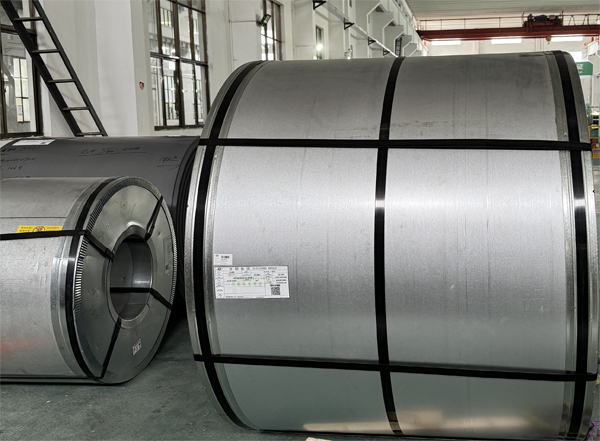In the electrical and manufacturing industries, silicon steel mother coils serve as the fundamental raw material for producing electrical steel sheets. These sheets are indispensable in creating efficient transformers, motors, generators, and other electrical devices. But what exactly are silicon steel mother coils? What makes them so special? And why do manufacturers prefer them over other materials?
What Are Silicon Steel Mother Coils?
Silicon steel mother coils are large, rolled coils of electrical steel enriched with silicon, typically in the range of 1% to 4.5%. The term "mother coil" refers to the initial large coil from which thinner steel sheets or strips are cut or slit for further processing.
The addition of silicon dramatically improves the steel's electrical resistivity and magnetic properties, making it ideal for use in magnetic cores of electrical machines.
Why Is Silicon Added to Steel?
Silicon in steel serves several key functions:
Reduces Electrical Losses: Silicon increases resistivity, which lowers eddy current losses in alternating magnetic fields.
Improves Magnetic Permeability: This enhances the steel’s ability to channel magnetic flux efficiently.
Increases Mechanical Strength: Silicon strengthens the steel without significantly impacting ductility.
Improves Surface Insulation: Some silicon steel grades have oxide coatings to further reduce losses.

What Are the Main Types of Silicon Steel Mother Coils?
1. Grain-Oriented Silicon Steel (GO) Mother Coils
Oriented such that magnetic grains align in the rolling direction.
Used mainly in transformer cores for minimal hysteresis and core losses.
Offers high magnetic permeability and low core loss in one preferred direction.
2. Non-Grain-Oriented Silicon Steel (NGO) Mother Coils
Magnetic grains are randomly oriented.
Suitable for rotating machines like motors and generators where magnetic flux changes direction.
Provides balanced magnetic properties in all directions.
How Are Silicon Steel Mother Coils Manufactured?
The production process generally involves:
Melting and Casting: High purity iron with precise silicon content is melted and cast into slabs.
Hot Rolling: The slab is hot rolled into thick coils.
Cold Rolling: To reach desired thickness (often 0.2mm to 0.5mm).
Annealing: Heat treatment to optimize magnetic properties and relieve internal stresses.
Coating: Applying an insulating coating to reduce eddy current losses.
The final mother coil can weigh several tons and is then slit or cut according to client specifications.
What Are the Key Properties and Specifications?
Thickness: Usually ranges from 0.23mm to 0.5mm
Silicon Content: Typically 1.0% to 4.5%
Magnetic Properties: Low core loss (W/kg), high magnetic permeability
Coating: Electrical insulation coatings such as inorganic oxides
Standards: ASTM A677, JIS, EN 10106, GB/T standards depending on region
What Are the Main Applications of Silicon Steel Mother Coils?
Power Transformers: Core laminations that reduce energy losses during voltage conversion.
Electric Motors & Generators: Stator and rotor cores that optimize efficiency and reduce heat.
Inductors & Reactors: Magnetic cores that ensure stable inductance with low losses.
Other Electrical Devices: Sensors, solenoids, and choke coils.
Why Are Silicon Steel Mother Coils Important for Energy Efficiency?
Electrical machines are responsible for a significant portion of global electricity consumption. Using high-quality silicon steel mother coils:
Minimizes Core Losses: Reducing wasted energy in transformers and motors.
Improves Performance: Enhances machine reliability and lifespan.
Reduces Carbon Footprint: By lowering operational energy, silicon steel contributes to greener technology.
How to Choose the Right Silicon Steel Mother Coil?
Determine Application: Transformer cores need GO steel; rotating machines need NGO steel.
Check Thickness: Thinner laminations generally reduce losses but may increase cost.
Consider Coating Type: Proper insulation improves efficiency.
Review Standards Compliance: Choose coils that meet relevant international or regional standards.
Evaluate Magnetic Properties: Loss, permeability, and saturation induction ratings matter.
Common FAQs About Silicon Steel Mother Coils
Q: Can silicon steel mother coils be recycled?
A: Yes, they are fully recyclable and commonly reused in manufacturing.
Q: What’s the difference between GO and NGO silicon steel?
A: GO steel has grains aligned for transformer efficiency, while NGO steel offers isotropic magnetic properties for motors.
Q: Are silicon steel mother coils custom-made?
A: Yes, suppliers often customize coil width, thickness, and coating to client needs.
Silicon steel mother coils are a cornerstone of modern electrical engineering, enabling highly efficient transformers, motors, and other devices critical for industry and daily life. Their magnetic properties, enhanced by silicon content and manufacturing precision, translate directly into energy savings and improved performance.
Choosing the right silicon steel mother coil—tailored to your specific application—ensures not only superior device functionality but also contributes to global energy conservation efforts. Whether you are a manufacturer, designer, or procurement specialist, understanding the nuances of silicon steel mother coils empowers smarter decision-making for sustainable, efficient electrical systems
 +86-523 8891 6699
+86-523 8891 6699  +86-523 8891 8266
+86-523 8891 8266  info@tl-core.com
info@tl-core.com  No.1, Third Industrial Park, Liangxu Street, Taizhou City, Jiangsu, China
No.1, Third Industrial Park, Liangxu Street, Taizhou City, Jiangsu, China 

 English
English Español
Español Türk
Türk 中文简体
中文简体